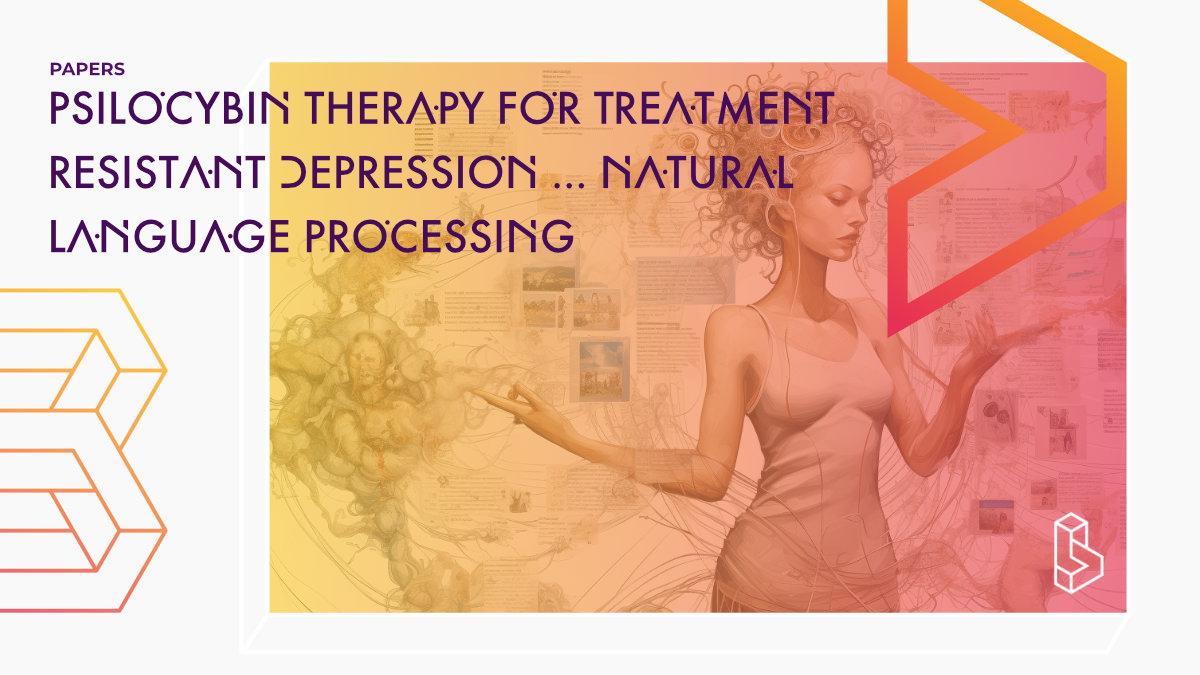This article of a language model (NLP, BART) finds that the audio from psychological support sessions (in the COMP360 trial for treatment-resistant depression, n=90 at 12 weeks) can predict clinical outcomes with high (85%) accuracy. The implications of this research signal that audio recordings can be used to predict who will respond to treatment and possibly aid in helping identify who would need more support.
Abstract of Psilocybin Therapy for Treatment Resistant Depression
“Background: Therapeutic administration of psychedelic drugs has shown significant potential in historical accounts and in recent clinical trials in the treatment of depression and other mood disorders. A recent randomized double-blind phase-IIb study demonstrated the safety and efficacy of COMP360, COMPASS Pathways’ proprietary synthetic formulation of psilocybin, in participants with treatment-resistant depression. While promising, the treatment works for a portion of the population and early prediction of outcome is a key objective.
Methods: Transcripts were made from audio recordings of the psychological support session between participant and therapist one day post COMP360 administration. A zero-shot machine learning classifier based on the BART large language model was used to compute two-dimensional sentiment (valence and arousal) for the participant and therapist from the transcript. These scores, combined with the Emotional Breakthrough Index (EBI) and treatment arm were used to predict treatment outcome as measured by MADRS scores.
Results: Two multinomial logistic regression models were fit to predict responder status at week 3 and through week 12. Cross-validation of these models resulted in 85% and 88% accuracy and AUC values of 88% and 85%.
Conclusions: A machine learning algorithm using NLP and EBI accurately predicts long-term patient response, allowing rapid prognostication of personalized response to psilocybin treatment and insight into therapeutic model optimization. Further research is required to understand if language data from earlier stages in thetherapeutic process hold similar predictive power.“
Authors: Robert F. Dougherty, Patrick Clarke, Merve Alti, Joanna Kuc, Danielle Schlosser, Boadie W. Dunlop, David J. Hellerstein, Scott T. Aaronson, Sidney Zisook, Allan H. Young, Robin L. Carhart-Harris, Guy Goodwin & Gregory A. Ryslik
Summary of Psilocybin Therapy for Treatment Resistant Depression
Major depressive disorder (MDD) affects one in six adults in their lifetime and is characterized by at least one depressive episode lasting 2 weeks or more. Patients with TRD suffer severe hardship and are at increased risk of impaired cognitive and social functioning, reduced quality of life, and suicidality. The cost of treating treatment-resistant depression in the USA is estimated to be between $29 and $48 billion annually. However, estimates of the prevalence of treatment-resistant depression vary widely in the literature, and the actual costs might be higher.
Studies involving psilocybin have shown positive results in addressing this challenge in patients with MDD, TRD, and anxiety in life-threatening cancer. A phase IIb study showed that psilocybin therapy can reduce depressive symptoms in 20% of patients.
Find this paper
https://doi.org/10.1007/s00213-023-06432-5
Open Access | Google Scholar | Backup | 🕊
Cite this paper (APA)
Dougherty, R. F., Clarke, P., Atli, M., Kuc, J., Schlosser, D., Dunlop, B. W., ... & Ryslik, G. A. (2023). Psilocybin therapy for treatment resistant depression: prediction of clinical outcome by natural language processing. Psychopharmacology, 1-9.
Study details
Compounds studied
Psilocybin
Topics studied
Treatment-Resistant Depression
Depression
Technology
Study characteristics
Placebo-Controlled
Active Placebo
Double-Blind
Randomized
Re-analysis
Participants
90
Humans
Authors
Authors associated with this publication with profiles on Blossom
Robin Carhart-HarrisDr. Robin Carhart-Harris is the Founding Director of the Neuroscape Psychedelics Division at UCSF. Previously he led the Psychedelic group at Imperial College London.
Guy Goodwin
Dr Guy Goodwin is the Chief Medical Officer at COMPASS Pathways and an Emeritus Professor of Psychiatry at the University of Oxford, UK. His research focusses on the neurobiology and treatment of mood disorders, such as bipolar depression, with a focus on the commercial development of COMP360 psilocybin.
Institutes
Institutes associated with this publication
COMPASS PathwaysCOMPASS Pathways is a publicly listed company (NASDAQ) that is developing psilocybin for treatment-resistant depression (TRD) for which it has completed a successful Phase IIb trial. COMPASS is one of the largest psychedelic companies and has received substantial investment from atai.
Compound Details
The psychedelics given at which dose and how many times
Psilocybin 1 - 25mg | 1x
Linked Clinical Trial
The Safety and Efficacy of Psilocybin in Participants With Treatment Resistant DepressionThe Safety and Efficacy of Psilocybin in Participants with Treatment Resistant Depression - a dose-ranging study.

